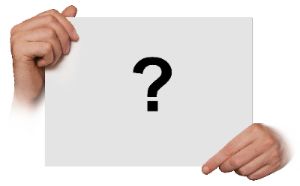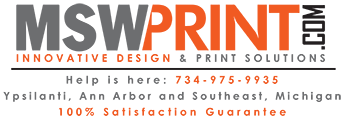
Here you'll find answers to common questions our clients ask. Start by selecting one of the links below. If you don’t see what you need – call or contact MSWPrint.com online.
- What type of products and services do you provide?
- How do I go about getting an estimate from you?
- Tips on how to save your design files
- At what resolution should I save my graphics and/or photos?
- What is a proof and why is it important that I look at it?
- What is the Pantone Matching System?
- Why do the printed colors look different from the colors on my screen?
- Is white considered a printing color?
- What file format should I use when submitting my electronic document for printing?
- Once I submit an order, how long will it take to finish my job?
-
Good question! We are a full service shop and offer a wide range of products and services. To see a full listing and description of what we can offer you, check out the Products & Services area of our website.
-
Well, since you are here, we would suggest you use our online estimate request form. Otherwise, the best way to ensure that we get all the information necessary to do an accurate quote is to give us a call and talk with one of our customer service representatives.
-
Tips on how to save your design files
Make them print ready and acceptable for us to print.
ADOBE ILLUSTRATOR-
. Embed all Images
. Convert all your text/copy to paths
. Export as Illustrator EPS or PDFMACROMEDIA FREEHAND-
. Embed all Images
. Convert all your text/copy to paths
. Export as Illustrator EPS or PDFCOREL DRAW-
Saving your Corel Draw file as an Adobe Illustrator EPS
. Embed all Images
. Convert all your text/copy to outline fonts
. Export as Illustrator EPSADOBE PHOTOSHOP-
. Flatten image and save as JPEG file - 300dpi, RGB or CMYK
. Rasterize all your text, if saving as a PSD file
. SAVE file as PSD (if file needs to remain in layers) or flatten artwork
and SAVE as JPEG.ADOBE INDESIGN-
Saving your InDesign file as an EPS
. Embed all Images & include separately as "Attachments"
. Convert all your text/copy to outline fonts
. Export your file as an EPS using the below settings:
Postscript Level 2
CMYK Mode
TIFF format and
BinaryADOBE PAGEMAKER-
Saving your PageMaker file as an EPS
. Embed all Images
. Convert all your text/copy to outline fonts
. Export your file as an EPS using the below settings:
Postscript Level 2
CMYK Mode
TIFF format and
BinaryMICROSOFT PUBLISHER-
You will need to have the full version of Adobe Acrobat PDF. If you don't
please download and use our Adobe Job Ready Program. If you do have the full
version of Adobe Acrobat PDF please follow the steps below.
Under File, Print, select Adobe PDF writer
Under Properties select Press Quality and Save your PDFMICROSOFT WORD-
. Only to be used for text narrative
. Images should "not" be embedded in the MS Word file, but sent as a
separate attachment.
. Images can be used for placement in your Word document but not for pulling
images.MICROSOFT POWERPOINT-
. Embed all Images In Your PowerPoint document/presentation
. Convert all your text/copy to outline fonts
. Save file as a PPT format -
At what resolution should I save my graphics and/or photos?
Resolution should be set to 300 dpi.
Pictures and graphics pulled from the internet are often low resolution, typically 72 dpi or 96 dpi. Avoid these graphics, as they will appear pixilated and blocky when printed.
Also note that you should save all photos in CMYK mode, not RGB mode when possible. Images saved in RGB mode may not print properly. If you are unable to save your image in CYMK mode, please let us know.
-
What is a proof and why is it important that I look at it?
In printing terms, a proof is a one-off copy of your document or a digital rendering of your job after all modifications and printing setup processes have been completed. It is your last and best opportunity to make sure that the print job comes out the way you want. By carefully inspecting the proof, you can help us assure an accurate, flawless delivery of your project on the first run.
-
What is the Pantone Matching System?
The Pantone Matching System (PMS) is a color reproduction standard in which colors all across the spectrum are each identified by a unique, independent number. The use of PMS allows us to precisely match colors and maintain color consistency throughout the printing process.
-
Why do the printed colors look different from the colors on my screen?
In short, printers and monitors produce colors in different ways.
Monitors use the RGB (red, green, blue) color model, which usually supports a wider spectrum of colors. Printers use the CMYK (cyan, magenta, yellow, black) color model, which can reproduce most—but not all—of the colors in the RGB color model. Depending on the equipment used, CMYK generally matches 85–90% of the colors in the RGB model.
When a color is selected from the RGB model that is out of the range of the CMYK model, the application chooses what it thinks is the closest color that will match. Programs like Adobe Photoshop will allow you to choose which color will be replaced. Others may not.
-
Is white considered a printing color?
Not typically. Because white is the default color of paper or other medium, it is simply recognized as the absence of any ink. However, when using colored paper or a dark garment or item, white ink may be used if any text or graphic requires it.
-
What file format should I use when submitting my electronic document for printing?
PDF (Portable Document Format) is the most common and preferred file format for submitting digital documents. With the installation of a PDF print driver on your computer, virtually any program can generate a PDF file suitable for printing. Both commercial and free PDF print drivers are available online for download from different sources.
-
Once I submit an order, how long will it take to finish my job?
Simple jobs are often completed in less than an hour. Some jobs, however, may take several days to complete depending on their complexity and size. We always strive to provide an accurate estimate of the turnaround time for each job we do. And we’ll always work with you to find ways to complete your project when you need it.
